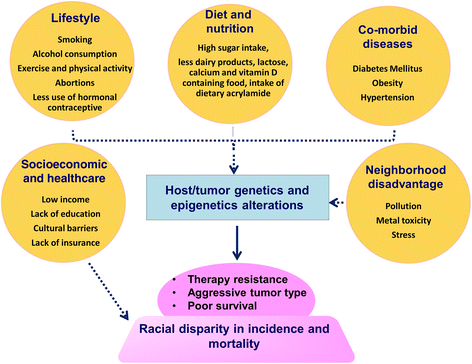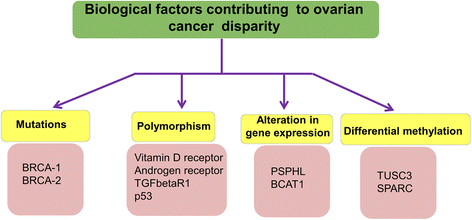Racial health disparities in ovarian cancer: not just black and white
- PMID: 28931403
- PMCID: PMC5607508
- DOI: 10.1186/s13048-017-0355-y
Racial health disparities in ovarian cancer: not just black and white
Abstract
Ovarian cancer (OC) is the most lethal gynecological malignancy, which disproportionately affects African American (AA) women. Lack of awareness and socioeconomic factors are considered important players in OC racial health disparity, while at the same time, some recent studies have brought focus on the genetic basis of disparity as well. Differential polymorphisms, mutations and expressions of genes have been reported in OC patients of diverse racial and ethnic backgrounds. Combined, it appears that neither genetic nor the socioeconomic factors alone might explain the observed racially disparate health outcomes among OC patients. Rather, a more logical explanation would be the one that takes into consideration the combination and/or the interplay of these factors, perhaps even including some environmental ones. Hence, in this article, we attempt to review the available information on OC racial health disparity, and provide an overview of socioeconomic, environmental and genetic factors, as well as the epigenetic changes that can act as a liaison between the three. A better understanding of these underlying causes will help further research on effective cancer management among diverse patient population and ultimately narrow health disparity gaps.
Keywords: Epigenetic; Ovarian cancer; Racial health disparity; Socioeconomic.
Conflict of interest statement
Authors’ information
SKS, AA, SS, RPR and APS are part of Health Disparities in Cancer Research Program at the University of South Alabama’s Mitchell Cancer Institute.
Ethics approval and consent to participate
Not Applicable.
Consent for publication
All authors agree to the submission of this article for publication.
Competing interests
APS and SS are co-founders and serve on executive management board of Tatva Biosciences LLC, a small business involved in the development of tools and models for cancer health disparity research among other things. SKS serves as the Director of Cell Biology and Genetics at Tatva Biosciences LLC.
Publisher’s Note
Springer Nature remains neutral with regard to jurisdictional claims in published maps and institutional affiliations.
Figures


References
Publication types
MeSH terms
Grants and funding
LinkOut - more resources
Full Text Sources
Other Literature Sources
Medical

